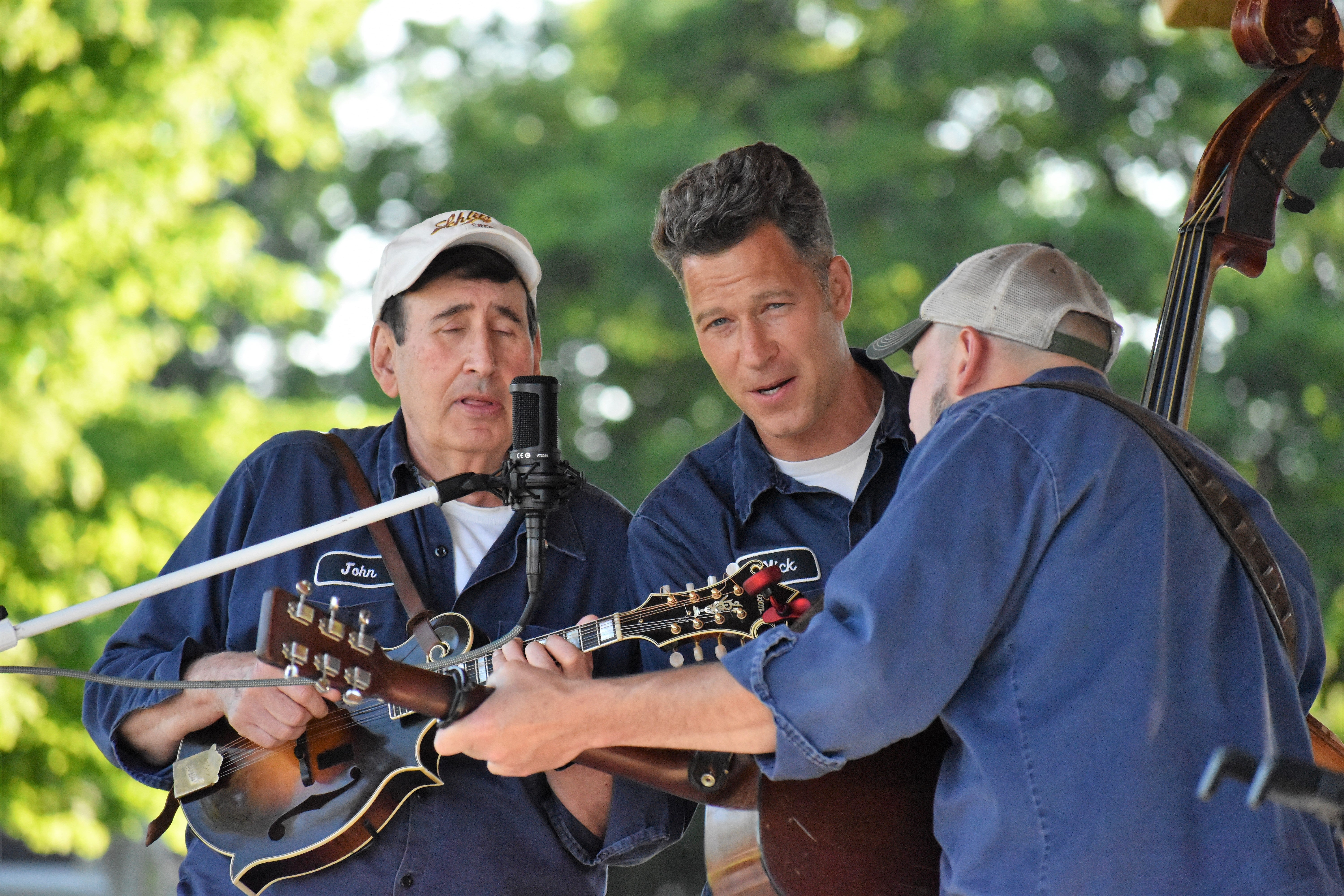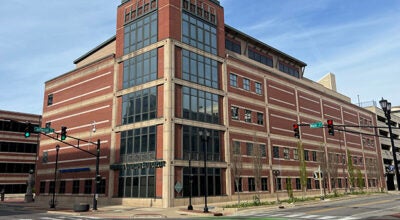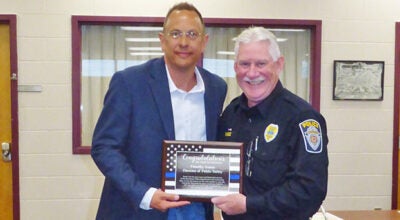Proos enters Senate race
Published 10:29 am Tuesday, February 16, 2010

State Rep. John Proos announced his bid for the state Senate in Dowagiac Monday noon flanked by his family: his wife Kristy and their three children, Elena, Jack and Nora. Though she shyly put her back to the camera, Nora warmed up and began dancing to "I'm a Little Teapot." Proos told supporters who filled the Upton Room of The Museum at Southwestern Michigan College, "My little teapot is the reason I'm doing what I'm doing. I love this community. I love our southwest Michigan region. And I hope I can make a difference - and I believe I can with your help," and his energy, vision and experience. (The Daily News/John Eby)
By JOHN EBY
Dowagiac Daily News
State Rep. John Proos, R-St. Joseph, Monday noon at Southwestern Michigan College announced his candidacy for the 21st state Senate seat held by term-limited Sen. Ron Jelinek, R-Three Oaks, on Presidents Day.
Joined by his wife, Kristy, and their children, Elena, Jack and Nora, U.S. Rep. Fred Upton’s former deputy chief of staff and district director, filled The Museum at Southwestern Michigan College Upton Room with area Republican notables, from Cass County GOP Chairman William LaBre to state Rep. Matt Lori, R-Constantine.
SMC Treasurer Tom Jerdon, County Commissioner Gordon Bickel Sr., R-Porter Township, Sheriff Joseph M. Underwood Jr. and County Treasurer Linda Irwin also attended.
Proos’ SMC thematic campaign stop, where he was introduced by President Dr. David M. Mathews and welcomed by Board of Trustees Chairman Dr. Fred L. Mathews, followed a morning appearance in Niles and preceded afternoon visits to South Haven and his hometown, St. Joseph.
“I have the energy, vision and experience needed to represent southwest Michigan in the state Senate,” Proos said. “Michigan, now more than ever, needs thoughtful leadership to insure that we focus our efforts on creating an environment that fosters jobs for our families. I will continue to fight for the retooling of our tax policy, educating the next generation and sustaining our local communities.”
The 21st state Senate District includes Cass, Berrien and most of Van Buren counties. Proos, a 1988 graduate of Lake Michigan Catholic High School, was elected in November 2004 to represent northern Berrien County in the 79th District of the Michigan House of Representatives.
Proos’ education includes a bachelor’s degree in political science from Marquette University in Milwaukee, Wis., and a master’s degree in higher education administration from Michigan State University.
Besides politics, Proos worked as vice president of Heritage Homes Inc. of Michigan in Berrien County.
President Mathews, who introduced Proos, said the lawmaker “helped us secure funding for the Michigan technology certification center and the current project underway right now to expand the Kairis complex for the automotive technology program. He serves on Appropriations,” which Jelinek chairs.
Rather than try to visit every southwest Michigan community, Proos said he settled on four – Niles, Dowagiac, South Haven and St. Joseph – as places he could talk about “the pillars of strength we have in our state.”
“We started in Niles this morning talking about jobs and the economy,” he said. “We talked about cross-competition along the border and what service taxes will mean to Michigan. We move over here to Dowagiac to talk about how education fits in. Early childhood education, how K-12 matters. Our ISD (Lewis Cass Intermediate School District in Cassopolis) is represented here today.
“How do we make sure that our four-year institutions and our community colleges – each serving very unique goals and objectives – matter to the jobs of tomorrow with today’s students? From here we head to South Haven” on Lake Michigan “because you can’t look twice at southwest Michigan and not think about tourism and agriculture – two huge parts of our economy. How do we grow that and use those as pillars of strength?”
Proos was to end his rollout in St. Joseph at the YMCA, “which I’ve worked with closely on health and wellness issues.”
“The most important part of my job is to listen to all of you,” Proos said, “so I can carry that message to Lansing. Far too often we’re forced to stand up as a region to scream about our great benefit and what we bring to our great state. Together, we’re a stronger voice. Southwest Michigan is a unique part of our state. We’re not West Michigan, nor are we mid-Michigan, so we better have a pretty strong voice. We’ve worked with 4,500 people in the five-plus years I’ve served as state representative who asked for resolution to their problems with a state agency. I ask for your vote in the August Republican primary and for your vote in the November general election should I win that primary.”
Proos chaired the House Republican Strategic Task Force on Jobs, which Feb. 9 issued its 33-page “Michigan Jobs Plan” to culminate a year of research and fact-gathering from the most reliable source on Michigan’s flagging economy – job providers who struggle daily to survive the state’s greatest economic slump since the Great Depression.
Proos told the Daily News, “Last year, at the beginning of my third and final term in the House, I was asked to chair several of my colleagues, including Rep. Jase Bolger” of Marshall.
“We sought to answer the question, ‘What are we doing right in the state?’ and ‘What are we doing wrong?’ And ‘What can we improve upon from a public policy perspective?’ ” Proos commented. “First and foremost, Michigan’s government isn’t going to create the jobs. We, as public policymakers, need to set a playing field that is at minimum, level, at best, tilted in favor of Michigan employers, so job providers can get people back to work.”
“What we found,” Proos continued, “we are doing some things well and things we can grow upon and develop. There are some things we’re not doing well. Our tax incentives aren’t nearly as transparent as they should be for the growth of business. Let’s cap some of those tax credits and instead invest that money in entrepreneurial start-ups, helping to alleviate the access to capital problem that exists today for small business start-ups. They’re having a heckuva time getting loans, to be quite frank about it. If we use some of the leverage of the state to do that, instead of all of the tax credits seeking the next big thing, let’s invest in the businesses that are already here.”
Proos continued, “If somebody has an interface with the state, you darn well better have a smile on your face because it’s a competitive environment. If somebody’s smiling on the phone from Indiana, and it’s cheaper to do business in Indiana and it’s difficult to do in Michigan, sounds like a small thing to accomplish, but working to insure that we have a business-friendly environment literally means that also – do you have a friendly face to speak to to answer the questions?
“Ultimately, and most important, we need to get rid of the Michigan business tax surcharge of 22 percent so businesses and industries can invest in their people, whether it be retraining at our community colleges or otherwise, and they can invest in the new tool that’s going to be the new contract that lands new jobs in their shop that means more stable families.
“The governor spoke an awful lot about changes in our tax system. Let’s talk about changes in our tax system after we’ve reformed some of these things and put Michigan in a stronger position. It’s a 33-page report with 14 specific bills already drafted and another 20 on the way. There’s no reason that we can’t in a bipartisan way – Republicans and Democrats – find solutions to those problems today because jobs won’t wait for us. They’ll go wherever.”
Proos and Lori heard Gov. Jennifer Granholm’s presentation last Thursday on a 5.5-percent sales tax.
“We would get a half-percent benefit” from the current six cents, he said, “but we would spread it to everything, including your plumber, your car wash, the guy who installs your pool, law services, your doctor. She was long on why that would be a good idea, but short on details of what that would mean. I’ll give you a small example. Today in Niles I met a young man who is out of work, but has his plumber license, so he’s looking at starting a small business. He said, ‘My home and shop are a mile and a half from the Indiana border. My client base is northern Indiana and southern Michigan. I’ll move to Indiana if it’s too expensive.’
“What about the plumber himself or herself? What about the wholesaler they bought the new stool or materials from? What about the manufacturer? Is that 5.5 percent, too? Are we adding 5.5 percent stop after stop after stop until Michigan business is 35 percent higher to do? I don’t know the answer to that yet. Matt and I and Sharon (Tyler, R-Niles, Dowagiac’s representative) are asking the question. What does (Granholm) mean? On the education side, right now about 76 percent of all of the six cents on sales tax goes directly to the school aid fund. Now that it’s down to 5.5 percent is it 76 percent of 5.5 percent? There are way too many questions right now before I could say that’s the way we should go.
“Some smart economists say the economy has changed. In the 1970s the manufacturing-based economy made sense for us to have sales tax on goods, rather than on services. But we’ve shifted more to a services economy. It makes some sense. But does it make economic sense for the small businesses I worry about? That’s the majority of southwest Michigan. Let’s implement the Jobs Task Force report. The sooner we have more taxpayers, we’ll have more tax dollars. (We’ve lost) a million jobs in 10 years.”
Jerdon said before coming out to the campus he wrote a $2,100 labor check to a plumber. “If you want less of something, just tax it. I’m remodeling three homes and hiring electricians, carpenters, plumbers, roofers. About 40 percent is materials and 60 percent labor. If 5.5 percent is pushed onto me, instead of a plumber from Niles, a carpenter from Edwardsburg, an electrician from Dowagiac, they’re going to be from Elkhart, Mishawaka and South Bend, or they’re going to have to eat it so I don’t have to so the tenant doesn’t have to.”
“We want to be competitive,” Proos said, “so we have to be very careful at how we look at any sweeping change.”
President Mathews pointed out that taxing physicians will be passed on in higher health care costs, which Proos called the “downstream impact that not only hits families, but all of you who provide health care plans, such as the county and the sheriff’s deputies. This needs to be a very thoughtful, dedicated debate. The governor did say on the one hand it’s revenue neutral, but on the other hand it will garner $580 million more. Matt turned around and gave me a little look, like, ‘Really?’ ”
Chairman Mathews, observed, “Citizen frustration is a disconnect between simple solutions they see and what the governor and many legislators do not. Fortunately, with our legislators, we don’t have that problem. We’re usually on the same wavelength.
“The number-one solution to Michigan’s manufacturing problem and economic problem can be done by changing about four words in the law to allow community colleges to offer baccalaureate degrees. In 45 years as chairman of the board here, of all the questions asked about the college, probably 98 percent are that. Industry does not come to Michigan because it looks at baccalaureate degrees is 22 percent in Cass County and 50 percent in Ann Arbor. Wonder why industry that comes into the state goes to Ann Arbor and nowhere else? I’ve been working on this for many years and we’ve finally got it out of the House committee to let us offer a few. Survey after survey for 30 years has shown a major barrier to a baccalaureate degree is access and cost. Community colleges can remove the barriers of access and cost.”
“There are two nuclear plants in southwest Michigan who want to pay for a four-year degree through Lake Michigan College,” added Proos, who expects the bill to clear the House. “Community colleges are traditionally looked at as very fleet of foot and able to move very quickly to address community needs. You do that every day. Our four-year institutions have a hard time doing that. As Dr. Mathews pointed out, that means an environment for jobs. You’ve got a higher baccalaureate degree level, you’ve got more people working and it’s presumably a better place to do business.”
Melinda Michael, Niles-based tourism director for Cass and Berrien counties, praised Proos as a “preacher of tourism for Michigan big-time. There isn’t anyplace I don’t see John, and he’s out there talking to people. I see him in Eau Claire at the Fruit Exchange. I see him in many other places talking to anybody and everybody he can reach about what their needs are that have to be met. That means a lot.”
“Agriculture and tourism are vying for our number-two industry,” Proos said. “If we can’t focus some time and attention on those two areas, then we’re missing the entire boat of things we should be growing. Our governor, for all her strengths, has failed to recognize agriculture as an important part of what we do in this state, which is second only to California in terms of the varieties of things we grow.”
Which gave Proos an opportunity to explain his 2005 selection as “Wine Michigan Legislator of the Year,” which Mathews kidded him about in his introduction.
“There is an awful lot of interest in the climate we have in southwest Michigan for very good grape growing,” Proos said. “Not just the Sonoma area in California or the Finger Lakes in New York, but because of Lake Michigan, I’ve been told, our micro-climate is one of the best in the world. Utilizing that as a growth opportunity is an agri-tourist’s dream, if you ask me. Imagine the wine trails having even greater exposure nationwide. We would benefit from all of those folks coming to our state.”






